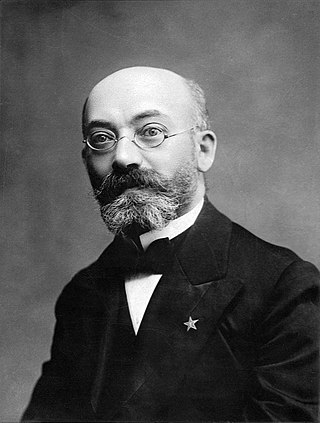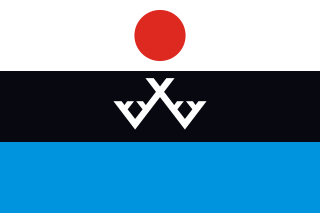Related Research Articles

Esperanto is the world's most widely spoken constructed international auxiliary language. Created by the Warsaw-based ophthalmologist L. L. Zamenhof in 1887, it was intended to be a universal second language for international communication, or "the international language". Zamenhof first described the language in Dr. Esperanto's International Language, which he published under the pseudonym Doktoro Esperanto. Early adopters of the language liked the name Esperanto and soon used it to describe his language. The word esperanto translates into English as "one who hopes".
Hawaiian is a Polynesian language of the Austronesian language family that takes its name from Hawaiʻi, the largest island in the tropical North Pacific archipelago where it developed. Hawaiian, along with English, is an official language of the US state of Hawaii. King Kamehameha III established the first Hawaiian-language constitution in 1839 and 1840.

Joseph Conrad was a Polish-British novelist and short story writer. He is regarded as one of the greatest writers in the English language; though he did not speak English fluently until his twenties, he came to be regarded a master prose stylist who brought a non-English sensibility into English literature. He wrote novels and stories, many in nautical settings, that depict crises of human individuality in the midst of what he saw as an indifferent, inscrutable and amoral world.

L. L. Zamenhof was an ophthalmologist who lived for most of his life in Warsaw. He is best known as the creator of Esperanto, the most widely used constructed international auxiliary language.

The Evenks are a Tungusic people of North Asia. In Russia, the Evenks are recognised as one of the indigenous peoples of the Russian North, with a population of 38,396. In China, the Evenki form one of the 56 ethnic groups officially recognised by the People's Republic of China, with a population of 30,875. There are 537 Evenks in Mongolia, called Khamnigan in the Mongolian language.

Omar Sharif was an Egyptian actor, generally regarded as one of his country's greatest male film stars. He began his career in his native country in the 1950s, but is best known for his appearances in American, British, French, and Italian productions. His career encompassed over 100 films spanning 50 years, and brought him many accolades including three Golden Globe Awards and a César Award for Best Actor.
The Ket language, or more specifically Imbak and formerly known as Yenisei Ostyak, is a Siberian language long thought to be an isolate, the sole surviving language of a Yeniseian language family. It is spoken along the middle Yenisei basin by the Ket people.
Evenki (Ewenkī), formerly known as Tungus or Solon, is the largest member of the northern group of Tungusic languages, a group which also includes Even, Negidal, and the more closely related Oroqen language. The name is sometimes wrongly given as "Evenks". It is spoken by Evenks or Ewenkī(s) in Russia and China.

Adyghe, also known as West Circassian, is a Northwest Caucasian language spoken by the western subgroups of Circassians. It is spoken mainly in Russia, as well as in Turkey, Jordan, Syria and Israel, where Circassians settled after the Circassian genocide. It is closely related to the Kabardian language, though some reject the distinction between the two languages in favor of both being dialects of a unitary Circassian language.

Crimean Tatar also called Crimean, is a Kipchak Turkic language spoken in Crimea and the Crimean Tatar diasporas of Uzbekistan, Turkey, Romania, and Bulgaria, as well as small communities in the United States and Canada. It should not be confused with Tatar proper, spoken in Tatarstan and adjacent regions in Russia; the languages are related, but belong to two different subgroups of the Kipchak languages and thus are not mutually intelligible. It has been extensively influenced by nearby Oghuz dialects.

Ahlem Mosteghanemi, alternatively written Ahlam Mosteghanemi is an Algerian writer who has been called "probably the world's best-known Arabophone woman novelist". She was the first Algerian woman to publish fiction in Arabic.

Multilingualism is the use of more than one language, either by an individual speaker or by a group of speakers. It is believed that multilingual speakers outnumber monolingual speakers in the world's population. More than half of all Europeans claim to speak at least one language other than their mother tongue; but many read and write in one language. Multilingualism is advantageous for people wanting to participate in trade, globalization and cultural openness. Owing to the ease of access to information facilitated by the Internet, individuals' exposure to multiple languages has become increasingly possible. People who speak several languages are also called polyglots.

The Soyot are ethnic group of Turkic origin live mainly in the Oka region in the Okinsky District in the Buryatia, Russia. According to the 2010 census, there were 3,608 Soyots in Russia. Their extinct language was of a Turkic type and basically similar to the Dukhan and closely related to the Tofa language.

A chum is a temporary dwelling used by the nomadic Uralic reindeer herders of northwestern Siberia of Russia. The Evenks, Tungusic peoples, tribes, in Russia, Mongolia and China also use chums. They are also used by the southernmost reindeer herders, of the Todzha region of the Republic of Tyva and their cross-border relatives in northern Mongolia. It has a design similar to a Native American tipi but some versions are less vertical. It is very closely related to the Sami lavvu in construction, but is somewhat larger in size. Some chums can be up to thirty feet in diameter.
Natalia Sergeyevna Gantimurova is a Russian beauty pageant titleholder who was crowned Miss Russia 2011 and represented her Russia in the 2011 Miss Universe and Miss World pageants.
Dular Osor Chaoke is a Chinese linguist at the Chinese Academy of Social Sciences. His primary area of study is on the Tungusic languages, especially his native Evenki language.
Khamnigan is a Mongolic language spoken east of Lake Baikal.
The Solon people are a subgroup of the Ewenki (Evenk) people of northeastern Asia. They live in China's Inner Mongolia Autonomous Region and Heilongjiang Province, and constitute the majority of China's Ewenki.
Eugene Petrovich Chelyshev or E. P. Chelyshev was a Russian Indologist, academician and public figure. He was a full-time member of the Russian Academy of Sciences (1987), and he was the Academician-Secretary of the Department of Literature and Language Sciences (1988–2002), and a member of the Presidium of the Russian Academy of Sciences. He was awarded two Orders of the Red Star, Order of the Patriotic War II degree (1985), Order "For Merit to the Fatherland" IV Degree (1997), III degree (2007), II degree (2020), Order of Honour (2012). Member of the Writers' Union of Russia.
Evenki orthgraphy is the orthography of the Evenki language.
References
- ↑ "3C World Fiction". Archived from the original on 2013-01-16. Retrieved 2012-08-03.
- ↑ Alexia Bloch. 2004. Red Ties and Residential Schools: Indigenous Siberians in a Post-Soviet State. University of Pennsylvania Press. p. 193
- ↑ UNESCO 2011. “Atlas of the World’s Languages in Danger”